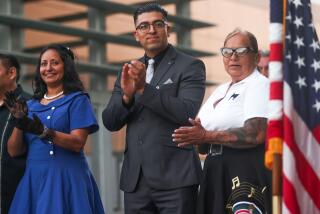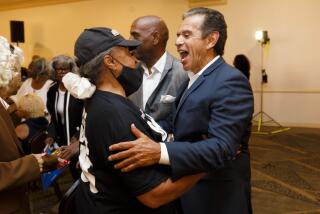Finance law does little to curb mayor’s fundraising
- Share via
When Los Angeles Mayor Antonio Villaraigosa arranged a reception celebrating trade with Mexico, two real estate developers stepped in to pay the $25,000 catering bill. One wants city approval for the 5,553-home subdivision known as Las Lomas.
When Villaraigosa welcomed then-British Prime Minister Tony Blair to the mayor’s mansion, four companies covered the $60,000 tab. One is building condominiums in Hollywood, and another wants the city’s help in revitalizing a historic theater district.
And when Villaraigosa was host for four days of festivities for the U.S. Conference of Mayors last summer, he took in $1.6 million from dozens of contributors, many of whom do business with City Hall.
Two decades ago, Los Angeles voters approved a campaign finance law that prohibits citywide candidates from raising more than $1,000 from a single donor in each election cycle, a move designed to prevent special interests from wielding too much influence over a politician.
But during his first two years in office, the mayor raised $19.6 million for his favorite political, policy and philanthropic causes, largely by asking scores of companies and individuals for five- and six-figure contributions.
The money raised for those causes is triple the $6.45 million Villaraigosa collected from private donors during the 2005 mayor’s race, a Los Angeles Times review has found. Though the $1,000-limit applied to the mayoral campaign, no such rule exists for the money Villaraigosa has raised since taking office.
The efforts dwarf the fundraising of the mayor’s predecessor, James K. Hahn, who faced criticism for the six-figure contributions he collected during his fight against the San Fernando Valley secession drive.
From July 2005 to July 2007, the mayor collected donations for more than a dozen causes, including the after-school program L.A.’s Best, the campaign to plant 1 million trees, legislation to give the mayor more power over public schools, the campaign to elect a new school board majority, a proposal to give signing bonuses to new police officers, and the U.S. Conference of Mayors.
Villaraigosa has more than three dozen donors who have given $75,000 or more, many of whom spread their contributions across multiple mayoral initiatives. The donors include charitable foundations, insurance companies, city contractors and real estate developers with projects across Los Angeles.
The mayor’s willingness to tap so many companies for so many initiatives unnerves some neighborhood leaders, who contend that City Hall has become an uneven playing field, where big contributors have far more pull than the average citizen.
“The money we’re talking about, that is . . . just a lot of goodwill,” said Laura Lake, a Westwood-based activist who also works as a land-use consultant. “It means that every call will be returned [by city officials] and every effort will be made to accommodate requests” from the people who gave the money.
Villaraigosa declined to comment directly for this report.
But spokesman Matt Szabo said the contributions do not in any way affect how the mayor or his appointees handle city projects. Villaraigosa has a duty to “inspire the business community” -- and spare taxpayers from paying for certain city initiatives, Szabo said.
“The mayor will continue to challenge the businesses who benefit from what Los Angeles offers,” Szabo added. “He will continue to challenge those businesses to contribute to solutions to L.A.’s problems.”
The Times analysis included only the first two years of Villaraigosa’s term because some fundraising reports covering the last five months don’t have to be submitted until next year. As a result, the Times did not factor in money accepted since July 1, including a $50-million philanthropic contribution to the mayor’s latest education initiative.
Asking for charitable contributions is now standard practice for statewide elected officials, including Gov. Arnold Schwarzenegger and Atty Gen. Jerry Brown. Still, with so many opportunities to give at City Hall, Villaraigosa has taken charitable fundraising to a new level, one campaign finance expert argued.
“People are giving to him for the same reason that they are giving campaign contributions, and that’s to be on the good side of the mayor and to be recognized by him,” said Robert Stern, the president of the nonprofit Center for Governmental Studies who helped write California’s political reform act. “This is, in a sense, the new form of campaign contributions.”
Some of the mayor’s biggest donors have long been believers in his education vision, including billionaire Eli Broad, who contributed $3.6 million to L.A.’s Best and personally called state lawmakers in 2006 in an effort to help Villaraigosa gain control over the Los Angeles Unified School District.
Broad ultimately disagreed with the mayor on the final version of a school reform bill, but he continued to lobby city officials on other issues, including the Grand Avenue project, a complex of shops, housing and a hotel that is slated to receive $65 million in tax rebates from the city.
Other contributors have interests that go beyond the philanthropic, including Los Angeles-based J.H. Snyder Co., which hopes to rebuild the Valley Plaza mall in North Hollywood. The company is seeking money for its project from the Community Redevelopment Agency, which is overseen by mayoral appointees.
As the CRA discussed those issues over the last two years, J.H. Snyder Co. repeatedly wrote checks to causes backed by the mayor, contribution records show.
The company gave $10,000 when the mayor took office in 2005, buying a table at his inaugural gala and fundraiser for L.A.’s Best, where guests dined on herb-crusted beef with tomato confit prepared by chef Joachim Splichal.
A year later, the company contributed $50,000 to the mayor’s efforts to pass an education bill in Sacramento. And last winter, Snyder donated $50,000 to the mayor’s campaign to elect three school board members, all of whom won.
Like several other contributors, Snyder representatives declined to discuss the mechanics of the company’s giving. “It’s just not something we’re interested in talking about,” said Eric Moses, a lobbyist for the developer.
Other Villaraigosa contributors regularly appear before city panels. Last week, Villaraigosa’s appointees on the Central Los Angeles Planning Commission were asked to grant a liquor and dance floor permit to Michael Delijani, owner of a historic theater on Broadway. Delijani spent $70,000 on the mayor’s initiatives.
Three weeks ago, the City Council approved Fig Central, a project that would bring 860 homes and 222 hotel rooms to downtown Los Angeles. Villaraigosa’s appointees at the Planning Commission approved the project in August, a few months after the developer had given $100,000 to the mayor’s school board campaign.
And over the last four weeks, two municipal pension systems -- each with a board made up mostly of members selected by Villaraigosa -- voted to invest $45 million in the Ares Distressed Securities Fund. That fund is the creation of Ares Management, whose co-founder, Antony Ressler, gave $75,000 to Villaraigosa’s campaign.
Ressler, a major advocate of charter schools, said the contributions are one of many he makes to education and bears no relationship to the city’s pension decisions. “I’ve never had a discussion with the mayor on any of our business activities,” he added.
Villaraigosa has the power to influence city contracts and construction projects through his volunteer commissioners, each of whom serves at his pleasure, and through the city department heads whom he hires and fires.
The mayor also has a business team that focuses on some of the largest projects, including some backed by his major contributors.
Szabo, the mayor’s spokesman, contended that Villaraigosa has been the most forthcoming of any mayor in Los Angeles history in making a record of his fundraising activities, as required by state law.
Still, Szabo would neither name the Villaraigosa staffers who make fundraising calls on behalf of the mayor nor say whether they include top deputies who coordinate city programs and initiatives.
Villaraigosa has been far more successful in fundraising than Hahn, who collected $6.2 million in contributions for a single cause: the 2002 campaign to fight the Valley secession attempt.
Hahn’s predecessor, Mayor Richard Riordan, raised millions to complete construction of downtown’s Walt Disney Hall. But the Ethics Commission then did not keep records on money raised on behalf of charitable causes, so his total is unknown.
Roughly one-third of the money reported by Villaraigosa went to political action committees that focused on his education policies. The rest went to the mayor’s other policy and philanthropic pursuits.
Under state law, the mayor must report any contribution of $5,000 or more that he or his representatives raise at the behest of another entity. As a result, Villaraigosa disclosed donations for such events as the celebration of Latino Heritage Month, a roast in the mayor’s honor staged by the American Diabetes Assn. and the reception for trade with Mexico, which was canceled at the last minute -- after the money had been spent.
Villaraigosa raised more than $600,000 over the last two years for Big Sunday, a citywide community volunteer effort. The latest event, held in April, was promoted on posters as “Mayor Antonio R. Villaraigosa presents Big Sunday.”
Two months after Big Sunday, the mayor enhanced his image nationally by playing host to officials from across the country at the four-day U.S. Conference of Mayors. To pay for a series of receptions that week, Villaraigosa raised $1.6 million from more than 40 private contributors. Parsons Corp., which bids on contracts at Los Angeles International Airport, gave $100,000. Related Cos., which is developing the Grand Avenue project, gave $50,000.
So did developer JMB Realty Corp., which won approval last year for two 47-story condominium towers in Century City.
The events gave Villaraigosa opportunities to promote himself and his causes in ways that go beyond the traditional bully pulpit, said Darry Sragow, a political consultant whose firm bought a $10,000 table at the inaugural gala.
“It’s about raising his profile to assure easy reelection and increase his prospects for a run for higher office -- and finding a way to pay for it,” he said.
--
--
Begin text of infobox
The mayor’s money
During his first two years in office, Los Angeles Mayor Antonio Villaraigosa raised more than $19 million for his political, policy and philanthropic pursuits, three times what he collected for his 2005 mayoral campaign. Much of the money came from individuals and companies doing business with City Hall:
Organization
Amount (in millions)
Mayor’s Inaugural Gala*... $5.79
Partnership for Better Schools**... 3.71
Million Trees Program... 3.28
Mayor’s Committee on Government
Excellence and Accountability***... 1.69
U.S. Conference of Mayors receptions and galas... 1.61
Hiring bonuses for new police officers... 1.00
Big Sunday community cleanups... 0.61
Others... 1.88
Total... $19.57 million
*Fundraiser for after-school program L.A.’s Best
** Supported three school board candidates backed by mayor
*** Pushed legislation to give mayor authority over L.A. school district
Note: The nine other groups and activities include the American Diabetes Foundation roast featuring the mayor and a reception for then-Mexican President Vicente Fox.
Sources: Los Angeles Ethics Commission, Office of the Mayor, Times reporting
More to Read
Sign up for Essential California
The most important California stories and recommendations in your inbox every morning.
You may occasionally receive promotional content from the Los Angeles Times.











